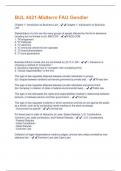Tentamen (uitwerkingen)
BUL 4421-Midterm FAU Gendler Questions + Answers Graded A+
- Vak
- Instelling
Chapter 1: Introduction to Business Law - ️️Chapter 1: Introduction to Business Law Stakeholders of a firm are the many groups of people affected by the firm's decisions, including but not limited to (6): MECCOF - ️️FACE-COM 1. *M*anagement 2. *E*mployees 3. *C*ustomers 4. *C*ommunit...
[Meer zien]



